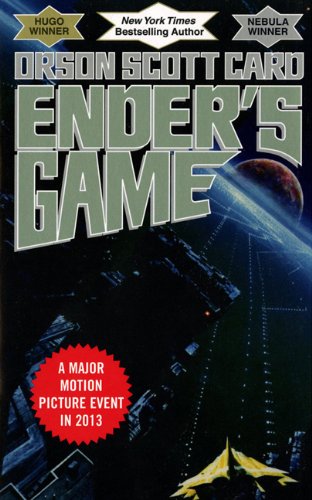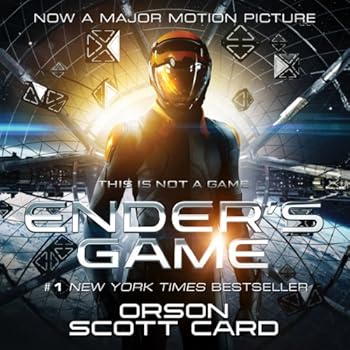
![]() Ender’s Game by Orson Scott Card
Ender’s Game by Orson Scott Card
Ender Wiggin is a “Third.” His parents were allowed to have him only because their first two children, Peter and Valentine, showed so much promise. Earth is expecting another Bugger attack from outer space and humans are desperately trying to breed and train the children who they hope will be Earth’s saviors. Peter, Valentine, and Ender Wiggin are all geniuses, but Ender seems to have just the right balance of intelligence, resolve, independence, and sensitivity to make a great leader for Earth’s international forces.
When Ender is only six years old, the International Fleet comes to take him away to Battle School. There he meets dozens of other little geniuses, some who resent Ender for his quick advancement, and some who would even like to get him out of the way. Does Ender have what it takes to make it through the rigorous training and to become the military hero that Earth hopes for? Or, as he fears, will he grow up to be like his tyrannical and sadistic older brother?
Ender’s Game by Orson Scott Card was published in 1985 and was based on a short story that Card wrote in 1977. The novel won both the Hugo and Nebula Awards. The focus is on Ender’s psychological drama as he is raised by indifferent parents (they know he’ll be taken away at an early age), tortured by a cruel brother, separated from his beloved sister, and cast without a friend into a highly competitive and often hostile environment where he’s expected to rise to the top. During all of this, Ender wonders if he will be responsible for saving Earth, or destroying it. There’s a lot resting on Ender’s little shoulders and the tension never lets up. At times Ender becomes whiny and emotionally overwrought, but who can blame him?
The main characters in Ender’s Game are young children and there are plenty of silly jokes about farts and butts, but there’s also some bad language, quite a lot of violence, and discussions about diplomacy and politics that will be too heavy for younger readers. Ender’s got plenty of personal flaws, too, and he has to deal with some major ethical issues such as does the end justify the means?
Thus, Ender’s Game is classified as Young Adult. Teens will enjoy Ender’s training at Battle School. The trainees are divided into teams and the battle tactics they learn are practiced in mock battles under zero gravity conditions. These scenes are great fun and, surprisingly, they don’t become dull because the difficulty and the stakes keep rising. During his time off, Ender plays a fantasy RPG that he wants to conquer without realizing why. He doesn’t understand why the game acts as it does, but it turns out to have a provocative significance later on.
Ender’s Game is fast-paced and becomes steadily more intense as the book goes on. Near the end there’s a huge twist that will leave your jaw on the floor, and several other tantalizing discoveries follow. I look forward to reading more about these in the first sequel, Speaker for the Dead, which also won both the Hugo and Nebula awards.
Interestingly, the U.S. Marines has Ender’s Game on its Professional Reading List, explaining in their Ender’s Game Discussion Guide that “Ender’s Game is more than about the difficulty and excitement that competition provides in preparing for combat. There are lessons in training methodology, leadership, and ethics as well. Such richness in range and treatment has made Card’s book an oft-read and re-read title for many years; Ender’s Game has been a stalwart item on the Marine Corps Reading List since its inception.”
I read Audio Renaissance’s full-cast audio version of Ender’s Game which was narrated mostly by Stefan Rudnicki (my favorite reader), Harlan Ellison, Gabrielle De Cuir, and David Birney. There’s also a cameo by Orson Scott Card. This audiobook is terrific. There’s also a long but interesting author’s note at the end, read by Orson Scott Card. He talks about the book, the audiobook production, and the upcoming movie (set for release on March 15, 2013). I’m looking forward to that movie.














One of my top ten books.